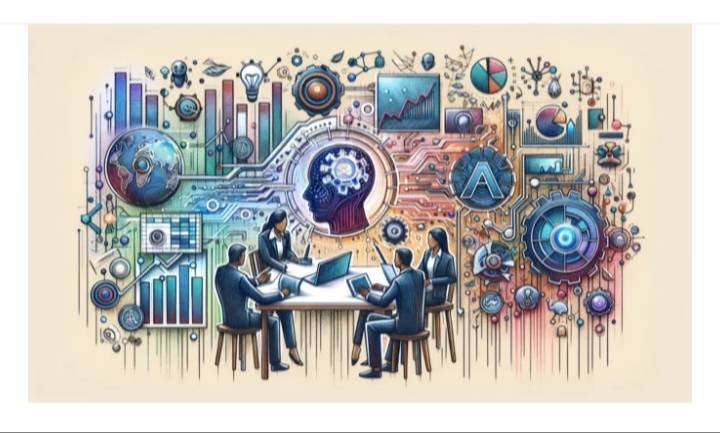
2025-02-18 01:53
IndustriThe economics of artificial intelligence
#firstdealofthenewyearastylz
The economics of artificial intelligence (AI) is a rapidly evolving field that explores the impact of AI on economic growth, productivity, and employment.
*Key Economic Benefits of AI:*
1. *Increased Productivity*: AI can automate routine and repetitive tasks, freeing up human workers to focus on higher-value tasks that require creativity, problem-solving, and innovation.
2. *Improved Efficiency*: AI can optimize business processes, reduce waste, and improve decision-making, leading to cost savings and increased competitiveness.
3. *Enhanced Innovation*: AI can enable new products, services, and business models, driving innovation and economic growth.
4. *Job Creation*: While AI may automate some jobs, it may also create new job opportunities in fields like AI development, deployment, and maintenance.
*Key Economic Challenges of AI:*
1. *Job Displacement*: AI may displace certain jobs, particularly those that involve routine or repetitive tasks.
2. *Inequality*: The benefits of AI may accrue to a small group of highly skilled workers, exacerbating income inequality.
3. *Bias and Fairness*: AI systems can perpetuate existing biases and discriminate against certain groups, raising concerns about fairness and equity.
4. *Regulatory Challenges*: The rapid development and deployment of AI raise regulatory challenges, particularly in areas like data protection, privacy, and accountability.
*Economic Sectors Most Impacted by AI:*
1. *Manufacturing*: AI can optimize production processes, improve product quality, and reduce waste.
2. *Healthcare*: AI can improve diagnosis, treatment, and patient outcomes, while also reducing healthcare costs.
3. *Transportation*: AI can enable autonomous vehicles, improve traffic management, and reduce transportation costs.
4. *Finance*: AI can improve risk management, credit scoring, and portfolio optimization, while also reducing financial transaction costs.
*Policy Recommendations:*
1. *Invest in Education and Training*: Governments should invest in education and training programs that help workers develop the skills needed to work with AI.
2. *Encourage Innovation*: Governments should encourage innovation by providing funding for AI research and development, and by creating tax incentives for AI startups.
3. *Address Job Displacement*: Governments should implement policies to address job displacement, such as universal basic income, retraining programs, and social safety nets.
4. *Establish Regulatory Frameworks*: Governments should establish regulatory frameworks that ensure AI systems are transparent, explainable, and fair.
Suka 0
Nicky bella
Trader
Diskusi populer
Industri
СЕКРЕТ ЖЕНСКОГО ФОРЕКСА
Industri
УКРАИНА СОБИРАЕТСЯ СТАТЬ ЛИДЕРОМ НА РЫНКЕ NFT
Industri
Alasan Investasi Bodong Tumbuh Subur di Indonesia
Industri
Forex Eropa EURUSD 29 Maret: Berusaha Naik dari Terendah 4 Bulan
Analisis pasar
Bursa Asia Kebakaran, Eh... IHSG Ikut-ikutan
Analisis pasar
Kinerja BUMN Karya Disinggung Dahlan Iskan, Sahamnya Pada Rontok
Klasifikasi pasar

Platform

Pameran

Agen

Perekrutan

EA

Industri

Pasar

Indeks
The economics of artificial intelligence
 Hong Kong | 2025-02-18 01:53
Hong Kong | 2025-02-18 01:53#firstdealofthenewyearastylz
The economics of artificial intelligence (AI) is a rapidly evolving field that explores the impact of AI on economic growth, productivity, and employment.
*Key Economic Benefits of AI:*
1. *Increased Productivity*: AI can automate routine and repetitive tasks, freeing up human workers to focus on higher-value tasks that require creativity, problem-solving, and innovation.
2. *Improved Efficiency*: AI can optimize business processes, reduce waste, and improve decision-making, leading to cost savings and increased competitiveness.
3. *Enhanced Innovation*: AI can enable new products, services, and business models, driving innovation and economic growth.
4. *Job Creation*: While AI may automate some jobs, it may also create new job opportunities in fields like AI development, deployment, and maintenance.
*Key Economic Challenges of AI:*
1. *Job Displacement*: AI may displace certain jobs, particularly those that involve routine or repetitive tasks.
2. *Inequality*: The benefits of AI may accrue to a small group of highly skilled workers, exacerbating income inequality.
3. *Bias and Fairness*: AI systems can perpetuate existing biases and discriminate against certain groups, raising concerns about fairness and equity.
4. *Regulatory Challenges*: The rapid development and deployment of AI raise regulatory challenges, particularly in areas like data protection, privacy, and accountability.
*Economic Sectors Most Impacted by AI:*
1. *Manufacturing*: AI can optimize production processes, improve product quality, and reduce waste.
2. *Healthcare*: AI can improve diagnosis, treatment, and patient outcomes, while also reducing healthcare costs.
3. *Transportation*: AI can enable autonomous vehicles, improve traffic management, and reduce transportation costs.
4. *Finance*: AI can improve risk management, credit scoring, and portfolio optimization, while also reducing financial transaction costs.
*Policy Recommendations:*
1. *Invest in Education and Training*: Governments should invest in education and training programs that help workers develop the skills needed to work with AI.
2. *Encourage Innovation*: Governments should encourage innovation by providing funding for AI research and development, and by creating tax incentives for AI startups.
3. *Address Job Displacement*: Governments should implement policies to address job displacement, such as universal basic income, retraining programs, and social safety nets.
4. *Establish Regulatory Frameworks*: Governments should establish regulatory frameworks that ensure AI systems are transparent, explainable, and fair.
Suka 0
Saya juga ingin komentar
Tanyakan pertanyaan
0Komentar

Belum ada yang berkomentar, segera jadi yang pertama

Tanyakan pertanyaan
Belum ada yang berkomentar, segera jadi yang pertama